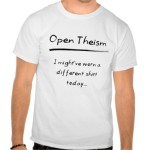We run our website the way we wished the whole internet worked: we provide high quality original content with no ads. We are funded solely by your direct support. Please consider supporting this project.
How do you respond to 2 Thessalonians 2:3–4?
“Let no one deceive you in any way; for that day will not come unless the rebellion comes first and the lawless one exalts himself above every so-called god or object of worship, so that he takes his seat in the temple of God, declaring himself to be God.”
As with most passages in the Bible that deal with eschatology, this one is shrouded in mystery and thus has many possible interpretations. We need not discuss these now. Suffice it to say that the passage assumes that God knows that Satan will unleash his fury in an unprecedented way at the end of the age. One of his strategies will apparently be to possess an evil influential person and carry out the things Scripture says regarding the Antichrist. He will try to deceive the nations, perform miracles, enter the temple and proclaim himself to be God.
How reassuring it is to know that Satan never takes God by surprise. Such reassurance is rooted in God’s perfect knowledge of Satan’s evil character and in his wisdom in working the decisions of free agents to his desired ends. We need not assume that the future is exhaustively settled in God’s mind to have confidence in his wisdom, however. While a lesser god would have to micro-manage the cosmos to achieve his goals, the true God is so sovereign he is perfectly capable of outwitting all his foes without having to meticulously control and foreknow every detail about the future.
Category: Q&A
Tags: Open Theism, Q&A
Topics: Open Theism, Responding to Objections
Verse: 2 Thessalonians 2
Related Reading

Lord Willing? Part 1
Greg sat down with Jessica Kelley recently to talk with her about her book Lord Willing?. We’re posting their conversation in three parts. Today, in part 1, Jessica shares the story of when her son Henry was diagnosed with an aggressive brain tumor at age 4. You can find part 2 of the interview here, and part…

Open2013 Reflections
Both participants and leaders share about what was happening at Open2013 and some of their thoughts on Open Theism. Listen in and hear from Greg Boyd, John Sanders, Tom Oord, T. C. Moore, Jessica Kelley and many more.

What is the significance of 2 Kings 13:3–5?
The Lord judged the Israelites by allowing them to be oppressed by King Hazael of Aram (vs. 3). “But Jehoahaz entreated the Lord, and the Lord heeded him; for he saw the oppression of Israel, how the king of Aram oppressed them. Therefore the Lord gave Israel a savior, so that they escaped from the…

Q&A: If Salvation Depends on our Free Choice, How are we Saved by Grace?
As a companion to today’s testimony and the link to Greg’s thoughts on Romans 9, we thought it would be helpful to post this Q&A on salvation by grace within the Open View of the future. Enjoy! Question: I’m an Arminian-turned-Calvinist, and the thing that turned me was the realization that if salvation hinges on whether…

Loving a Twilight Zone God?
David D. Flowers posted this insightful reflection over on his blog about an episode of The Twilight Zone and what it says about some pop views of God. Can we really love a God that exercises this kind of random control just because he can? We can certainly fear a God like this, but can…

